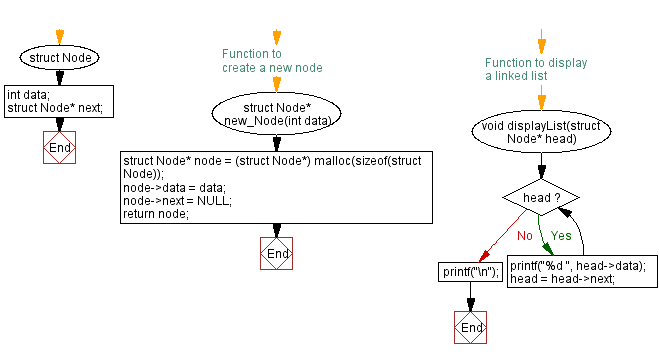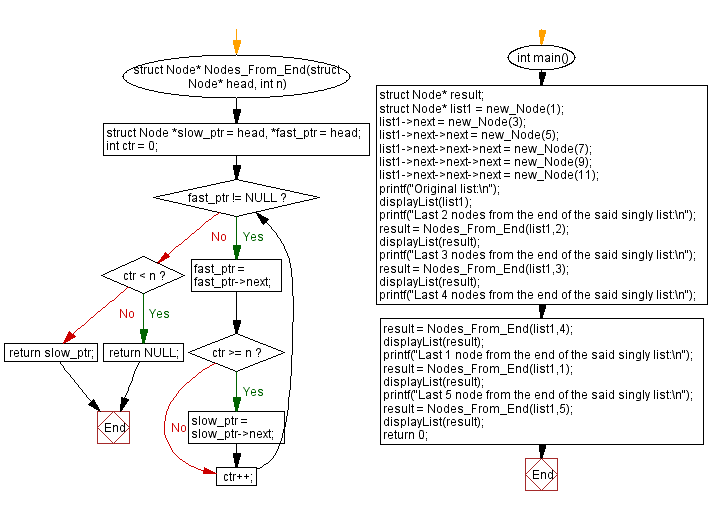C Exercises: Nodes from the end of a singly linked list
20. Nth Node from End Variants
Write a C program to get the n number of nodes from the end of a singly linked list.
Sample Solution:
C Code:
#include<stdio.h>
#include <stdlib.h>
// Define a structure for a Node in a singly linked list
struct Node {
int data;
struct Node* next;
};
// Function to create a new node with given data
struct Node* new_Node(int data) {
// Allocate memory for a new node
struct Node* node = (struct Node*) malloc(sizeof(struct Node));
// Set the data for the new node
node->data = data;
// Set the next pointer of the new node to NULL
node->next = NULL;
return node;
}
// Function to display the elements of a linked list
void displayList(struct Node* head) {
while (head) {
printf("%d ", head->data);
head = head->next;
}
printf("\n");
}
// Function to find the Nth node from the end of a linked list
struct Node* Nodes_From_End(struct Node* head, int n) {
struct Node *slow_ptr = head, *fast_ptr = head;
int ctr = 0;
// Move the fast pointer n positions ahead
while (fast_ptr != NULL) {
fast_ptr = fast_ptr->next;
// Once fast pointer is n nodes ahead, move the slow pointer
if (ctr >= n) {
slow_ptr = slow_ptr->next;
}
ctr++;
}
// If the number of nodes is less than N, return NULL
if (ctr < n)
return NULL;
return slow_ptr; // Return the node at Nth position from the end
}
// Main function where the execution starts
int main() {
struct Node* result;
struct Node* list1 = new_Node(1);
list1->next = new_Node(3);
list1->next->next = new_Node(5);
list1->next->next->next = new_Node(7);
list1->next->next->next->next = new_Node(9);
list1->next->next->next->next->next = new_Node(11);
printf("Original list:\n");
displayList(list1); // Display the original list
// Finding the last N nodes from the end of the list for different values of N
printf("Last 2 nodes from the end of the said singly list:\n");
result = Nodes_From_End(list1, 2);
displayList(result);
printf("Last 3 nodes from the end of the said singly list:\n");
result = Nodes_From_End(list1, 3);
displayList(result);
printf("Last 4 nodes from the end of the said singly list:\n");
result = Nodes_From_End(list1, 4);
displayList(result);
printf("Last 1 node from the end of the said singly list:\n");
result = Nodes_From_End(list1, 1);
displayList(result);
printf("Last 5 node from the end of the said singly list:\n");
result = Nodes_From_End(list1, 5);
displayList(result);
return 0; // Indicates successful completion of the program
}
Sample Output:
Original list: 1 3 5 11 Last 2 nodes from the end of the said singly list: 5 11 Last 3 nodes from the end of the said singly list: 3 5 11 Last 4 nodes from the end of the said singly list: 1 3 5 11 Last 1 node from the end of the said singly list: 11 Last 5 node from the end of the said singly list:
Flowchart :


For more Practice: Solve these Related Problems:
- Write a C program to find the nth node from the end of a singly linked list using the two-pointer approach.
- Write a C program to extract the last n nodes from a linked list and store them in a new linked list.
- Write a C program to recursively determine the nth node from the end of a singly linked list.
- Write a C program to extract nodes from the end of a linked list that satisfy a specific condition (e.g., being a prime number).
Go to:
PREV : Intersection Finder Variants.
NEXT : Partitioning with Dual Pivots.
C Programming Code Editor:
Have another way to solve this solution? Contribute your code (and comments) through Disqus.
What is the difficulty level of this exercise?
